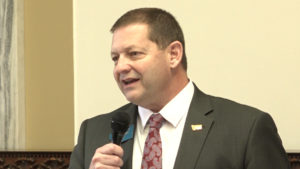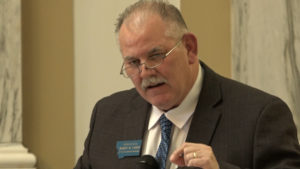HELENA — The Montana House Saturday gave its final approval to the bill continuing Medicaid expansion, which provides health coverage to 96,000 low-income adults in the state.
The House approved House Bill 658 on a 61-37 vote, sending it on to the Senate — where it’s expected to pass.
Support came from the same coalition of Democrats and moderate Republicans who voted Friday to advance the measure to its final vote.
Medicaid expansion, which began in January 2016, expires this June unless the Legislature reauthorizes it. It offers government-funded health coverage to adults earning up to 138 percent of the federal poverty level, or about $17,200 a year for a single person. The federal government pays 90 percent of the $700 million-a-year program.
HB658, sponsored by Rep. Ed Buttrey, R-Great Falls, continues the program but makes some changes, such as requiring some participants to log at least 80 hours of “community engagement,” which could be a job, job training, volunteer work, a full-time student, or a drug-treatment program.
The bill also includes several taxes to help finance the state share of the costs, including a 0.875 percent tax on Montana hospitals’ outpatient services. That tax generates $15 million a year for the state, but also generates another $100 million in federal matching funds for the hospitals, which they say is needed to help cover the cost of treating Medicaid patients.
HELENA — The Montana House on Friday easily endorsed a bill to continue Medicaid expansion in the state — a strong indication that the compromise proposal will eventually pass the Legislature and extend the program that provides health coverage to 96,000 low-income adults in the state.
A coalition of Democrats and moderate Republicans advanced House Bill 658 on a 61-39 vote, setting up a final vote in the House on Monday. The bill then would go to the Senate, where it’s expected to pass as well.
“In every corner of the state, and all parts in between, people have been impacted positively (by Medicaid expansion),” said Rep. Mary Caferro, D-Helena, shortly before the vote. “They have health care, they have a health-care system, they’re doing better, their children are being born into families where their parents are healthy. There is no denying it.”
The program began in January 2016 but expires this June unless the Legislature reauthorizes it. It offers government-funded health coverage to adults earning up to 138 percent of the federal poverty level, or about $17,200 a year for a single person. The federal government pays 90 percent of the $700 million-a-year program.
HB658 continues the program, but not without changes. The most substantial change is a requirement that some of the participants log at least 80 hours of “community engagement,” which could be a job, job training, volunteer work, a full-time student, or a drug-treatment program.

Rep. Ed Buttrey, R-Great Falls, the sponsor of HB658, said Medicaid expansion has been good for the state, but that his bill makes it better and more accountable to the taxpayers.
“This is good policy — not just for our most needy, but for all the taxpayers that fund this program in Montana,” he said.
But opponents of the bill blasted it as a bloated giveaway that voters rejected in the 2018 election, when they voted down a ballot measure to extend Medicaid expansion and raise tobacco taxes to help fund the state’s share.
“(Voters) told us in November,” said Rep. Barry Usher, R-Billings. “And all of you that continue to say we need this? Your voters said that, too.”

Opponents also tried 10 times to amend the bill during more than two hours of debate, but, each time, the coalition that endorsed the bill rejected the attempts.
Nineteen Republicans joined all 42 Democrats in favor of HB658 on Friday, and held together in the face of the attempted amendments.
House Minority Leader Casey Schreiner, D-Great Falls, said Democrats would have preferred a bill that didn’t place additional requirements on plan participants — but don’t want to leave the state’s poor without health coverage.
“What we’re stuck with today is a line in the sand that says, `Are we going to take 96,000 people’s health care away, or not?” he said. “This side of the aisle is not willing to do that.”
The bill also levies a 0.875 percent tax on Montana hospitals to help pay for the state share of the cost, at $15 million a year. Yet half the hospital tax revenue also generates another $100 million in federal matching funds for the hospitals, which they say is needed to help cover the cost of treating Medicaid patients.

